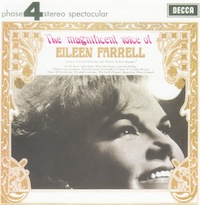 CD 11
CD 11 [36:41]
The Magnificent Voice of Eileen Farrell
Eileen Farrell (soprano)
The London Festival Orchestra and Chorus/Robert Sharples
rec. 1964
First released on LP as PFS 4052 (January 1965)
At the end of Part 1 the number of duds far outweighed the goodies; thanks to some fine Doráti CDs in Part 2 the balance has shifted, but only slightly. Part 3 looks reasonably promising, with discs from Arthur Fiedler and the Boston Pops and the only 2-CD set in the box, Anatole Fistoulari’s
Swan Lake. Generally the emphasis here is on lighter listening, starting with a slew of show tunes and traditional favourites from the American soprano Eileen Farrell. The presence of Robert ‘Bob’ Sharples and the London Festival Orchestra and Chorus is a pretty good indicator of what to expect from our first disc.
Eileen Farrell (1920-2002) was plucked from the CBS Radio Chorus in 1941 and launched on a singing career that even included a spell at the Met from 1960 to 1966. Opera lovers might well have heard her on the Beverley Sills
Maria Stuarda, reissued on Brilliant Classics, but here she’s firmly in popular mode. Musically the excerpts from
Carousel and
The Sound of Music are big and blowsy in a way that probably gladdened the hearts of those with a highly resonant radiogram. Her version of
Climb Ev’ry Mountain certainly doesn’t challenge that of the great Constance Shacklock, who sang the role of The Mother Abbess at London’s Palace Theatre from 1961 to 1967.
Farrell doesn’t do at all well under pressure – her final note in
Climb Ev’ry Mountain is simply excruciating – but she does rather better on the more mellow selections. May Brahe’s
Bless This House and Albert Malotte’s setting of
The Lord’s Prayer are typical examples; the latter is drenched in a
faux reverence that’s frankly toe-curling. Sharples’ arrangement of the spiritual
Deep River – with choral backing – isn’t far behind, with Farrell trying much too hard to emulate a style of singing that simply eludes her. As ever, balances are all over the place, with mega-harps and a veritable tsunami of strings in
Peace of Mind. The recording isn’t kind to Farrell’s voice; it’s either too close and breathy or bright and steely, with little of the ‘magnificent proportions’ noted in the singer’s
Daily Telegraph obituary.
This disc has one thing in its favour; it’s mercifully short.
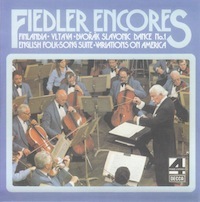 CD 12
CD 12 [68:55]
Jean SIBELIUS
Finlandia
Edvard GRIEG
Peer Gynt – Suites 1 and 2
Antonin DVOŘÁK
8 Slavonic Dances, Op. 46 No. 1
Bedřich SMETANA
Má Vlast - Vltava (The Moldau)
Ralph VAUGHAN WILLIAMS
English Folk Song Suite (transcr. Gordon Jacob)
Charles IVES
Variations on America (orch. William Schuman)
The Boston Pops Orchestra/Arthur Fiedler
rec. 1975/77
First released on LP as PFS 4352 (March 1976) and PFS 4426 (May 1978)
My earliest memories of Arthur Fiedler and the Boston Pops go back to the
Reader’s Digest LPs that my parents collected back in the early 1970s. Those big, shiny boxes with titles such as
The World’s Best Loved Classics were usually devoted to short showpieces and ‘bleeding chunks’. To my untutored ears these were entertaining and accessible albums; I daresay many others felt the same way, although such youthful enthusiasms do seem a little foolish half a lifetime later.
The performances on this CD were taped in Boston’s Symphony Hall near the end of Fiedler’s career.
Finlandia is a major disappointment; it’s hesitant where it should be heroic and small where it needs to be tall. The heavily compressed recording does little to promote a sense of presence and power; apart from the curtailed dynamics the thrilling bass that underpins the piece is rendered dull and boomy. The Grieg is similarly ill-focused and underpowered, the music devoid of all character or charm. Hiss is intrusive, as are Fiedler’s vocal contributions, and fades are as untidy as ever. Even if the band were on top form – which they aren’t – these dreary performances would have done for them as surely as a stiletto between the ribs.
Thankfully the dampers are lifted in the Dvořák, which has something of the incisiveness and energy one expects from this partnership. Ditto the Smetana, even if it sounds like the strings are playing in another room at times. As rivers go this isn’t the broadest - there are plenty of swirls and eddies here and there - but it does build to a splendid climax. By contrast Gordon Jacob’s Vaughan Williams transcriptions are bright and breezy, with a hint of Ealing comedy about them. The sound is close and rather brazen, but not unpleasantly so. Rather like William Schuman’s arrangement of Ives’s
Variations on America, in fact; still, this is the boisterous fare that Fiedler does best.
Grey, enervating performances of Sibelius and Grieg; the Ives is good fun.
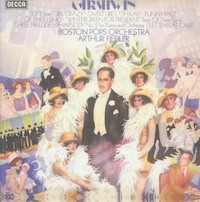 CD 13
CD 13 [57:36]
George GERSHWIN
Overtures to Girl Crazy, Oh Kay!, Funny Face, Let ‘em Eat Cake, Of Thee I Sing; Preludes 1-3; Rhapsody No. 2 for Piano and Orchestra
Ralph Votapek (piano)
The Boston Pops Orchestra/Arthur Fiedler
rec. 1978
First released on LP as PFS 4438 (October 1979)
I’m a great admirer of the late John McGlinn, whose advocacy and scholarship did so much to bring Broadway back into the core repertoire where it belongs; his Warner discs and sets – superbly sung, played and recorded - are indispensable to anyone interested in 20th-century Americana. In particular McGlinn’s Gershwin overtures are a toe-tapping delight that do full justice to these iconic scores; he just gets it right all the time, blending glitz with a thoroughly musical sensibility.
That said, this is the kind of repertoire that the genial Fiedler, with his legendary flair and bonhomie, should do well. And so it proves, for although these performances were recorded a year before his death they pulse with all the vibrancy and colour missing from CD 12. The overture to
Girl Crazy is just fabulous; the brass playing is glorious, and it’s all underpinned by a plush but very detailed recording. Even after that wonderful curtain- and spirit-raiser the easeful swing of the overture to
Oh, Kay! will keep you on cloud nine for a while yet. How extraordinary that the Phase 4 engineers could come up with such a beguiling sound here – Symphony Hall – but make such a pig’s ear of the music recorded in that venue just a few years earlier.
The remaining overtures – to
Funny Face,
Let ‘em Eat Cake and
Of Thee I Sing – are no less enjoyable. The wellspring of Gershwin’s genius has seldom flowed so freely, and it’s clear these players know
exactly how this music should go. Just sample the
faux martial start to
Let ‘em Eat Cake or the moodier passages in
Of Thee I Sing. I particularly like the crisp percussion and the snap of snare drums, all of which are very well caught. The
Three Preludes are less well recorded – they seem a little airless – but the supple playing is beyond reproach. What a pity, then, that the
Rhapsody No. 2 is ruined by Ralph Votapek’s oversized, jangling piano and a raucous recording.
Fiedler’s not quite in the McGlinn league, but he comes close; alas, the
Rhapsody is a buzz killer.
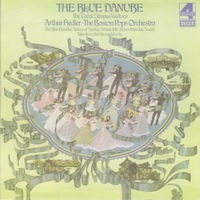 CD 14
CD 14 [64:43]
Johann STRAUSS
An der schönen blauen Donau, Geschichten aus dem Wienerwald, Frühlingsstimmen,
Künstlerleben, Rosen aus dem Süden
Peter Il’yich TCHAIKOVSKY
Nutcracker Suite, Op. 71a
The Boston Pops Orchestra/Arthur Fiedler
rec. 1975
First released on LP as PFS 7353 (October 1976) and PFS 4352 (March 1976)
Strauss waltzes next, and from the opening bars of
The Blue Danube it’s clear we’ve lost the warmth and spontaneity of the Gershwin disc. Not only that the feckless focus pullers are at it again. The tuttis don’t need a boost, but it seems producer Tony D’Amato and his team felt otherwise. The effect is strangely lopsided – the zither sounds like it was recorded in a completely different acoustic - but in spite of that I did enjoy these ‘big band’ performances. What Fiedler lacks in refinement he makes up for in vigour; however, the quietest passages of
Artist’s Life are blighted by his unguarded vocalising.
Fiedler’s Viennese sketches aren’t terribly subtle – enthusiasm triumphs over polish much of the time - but if you like your Strauss boldly drawn these performances should appeal. As for his
Nutcracker Suite it’s crisp and unfussy without sacrificing too much of the score’s magic. The national dances are deftly done, even if the
Trepak is dispatched with more dash than character. Most important the recording is reasonably atmospheric; it’s also free of distracting intervention, if not Fiedler’s grunts and groans.
An attractive disc; odd coupling.
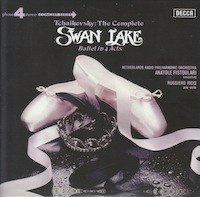 CD
CD 15/16 [156:45]
Peter Il’yich TCHAIKOVSKY
Swan Lake, Op. 20
Ruggiero Ricci (violin)
Netherlands Radio Philharmonic Orchestra/ Anatole Fistoulari
rec. 1972/73
First released on LP as 10BB 168-170 (August 1974)
Now for Anatole Fistoulari’s complete
Swan Lake, originally release on three LPs and presented here on two CDs in a gatefold sleeve. This was the Ukrainian conductor’s third recording of the ballet; the first was with the LSO in 1952 and the second, a highlights disc, was made with the Concertgebouw in 1961. The latter, reissued most recently on the enterprising Eloquence label, was once awarded a coveted rosette in the Penguin Guide. The orchestra here is the Netherlands Radio Philharmonic, who did rather well on CDs 7 and 9. Like the old Orchestre de la Suisse Romande they were capable of performances that belied their status as a second-rank ensemble.
Is this one of them? Sadly, no; there’s much to enjoy here, not least Fistoulari’s sense of urgency and drama thrust. He also brings out telling details and phrases, but generally he’s more robust than elegant. Fistoulari reminds me of Ansermet at times, although the latter’s
Swan Lake – not quite complete – has a theatrical flair and flexibility you won’t find here. That’s surprising, as Fistoulari was no stranger to the theatre, having worked and toured with the Ballets Russes in the 1930s. Also, he’s not well served by the somewhat relentless recording, which induces listener fatigue quite early on.
By contrast Ruggiero Ricci’s solos are fulsome to a fault, and the engineers don’t help by gilding his contribution in the most unnatural way. As for the orchestra they don’t play nearly as well for Fistoulari as they did for Doráti; they certainly can’t match Ansermet’s OSR for sheer passion and amplitude. Nowhere is that clearer than in the national dances, which Ansermet lifts and characterises most wonderfully; after that Fistoulari sounds rushed and heavy handed. At 150 minutes this is a long, hard slog.
Despite some promising discs we’re still deep in the debit column; dispiriting.
Dan Morgan











